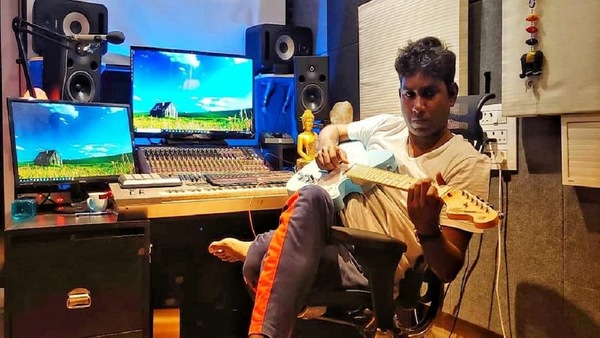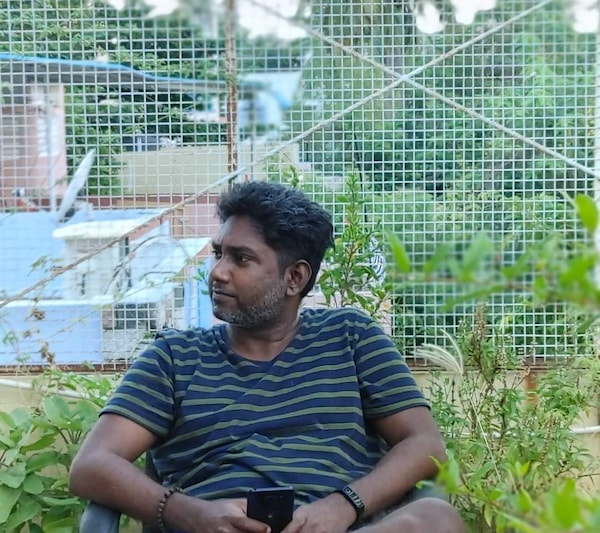Exclusive! Composer Shakthikanth Karthick: If there's some element of truth in my life, I would say it is with my music
The music director talks about his next release Nootokka Jillala Andagadu, life after Fidaa and why he prefers quality to quantity

Last Updated: 10.14 PM, Aug 17, 2021
Composer Shakthikanth Karthick isn't your quintessential film person. Although he's most active in Telugu films, he has a world of his own at his Chennai residence and finds a way to distance himself from the chaos of the industry every time things get overwhelming. Shakti, as he's addressed by most people who know him well, craves new experiences, enjoys his family time, nurturing his skills as much as the opportunity to compose for feature films or web shows or corporate/ad films. He calls himself a 'content man' to emphasise that he isn't desperate and doesn't chase work.
Despite working in high-profile projects like Satya 2, Fidaa, ZEE5's hit web show Gods of Dharmapuri, he's given more importance to quality over quantity, taking up projects that resonate with him and also pose a challenge. His next release Nootokka Jillala Andagadu, starring Srinivas Avasarala and Ruhani Sharma, too falls under that category. In a chat with OTTplay, Shakthikanth talks about his life after a blockbuster like Fidaa and how the pandemic hasn't been bad news when it comes to work and newer collaborations.
Naturally, one expected you to take up a lot of work after a monstrous success like Fidaa. However, it seems as if you were not interested in the number game...
I don't generally worry about aspects beyond my music. I've always done work at my own pace and only when something motivates me. Contrary to public perception, I need to admit that I didn't get a lot of offers post-Fidaa. Perhaps, there was a disconnect somewhere. However, I don't think too much about it because that's the way I am. I seek joy in whatever little I take up and do justice to a project to the best of my abilities. Films work under certain parameters and I find more freedom in the work I take up in the digital space.
Looking back at Fidaa, a Chennai boy like you composed Vachinde, probably the most iconic Telugu film number set in a Telangana backdrop to date. How did you nail the local flavour of the song so well despite not hailing from the region?
Oh, lots of research went behind it. I think it's the process of exploring something so different from your roots that made the experience more interesting. Many feel that Tamil Nadu and Telangana folk music are largely similar, but it is a wrong assumption and their histories are quite contrasting. I listened to a lot of Telangana folk songs to get used to the beats and capture the enthusiasm in their music. The song was about the lyrics (by Suddala Ashok Teja) as much as the music and it was a rare case where everything came together magically.
The industry subconsciously tends to give a lot of importance and credibility to the number of projects in an artiste's career to judge his/her worth. Aren't you affected by it?
I think it varies from person to person. Taking up several projects is also a reflection of the lifestyle that you seek, the house you want to buy, the car you want to travel in. I am an engineer who took to making music because it gives me pleasure. I don't want to look at music as a chore at any point in my life and put pressure on it to earn me money. Before I entered the industry, my only aim was to work with Ramgopal Varma and I did that with my very second film, Satya 2. Frankly, I peaked early (laughs). After watching the first half of Satya 2, RGV hugged and told me, 'Come to Mumbai. You're destined for bigger things.' That's enough for me. The reason for which I commit to a particular project is more important to me than the tally. I value the shelf life of my numbers more than simply committing to one project after the other to fill my pockets.

So, what was 'that' reason for Nootokka Jillala Andagadu?
The film is about a guy whose world changes when he realises that he's going bald. As a man who once feared losing my hair and wondered if I would go bald (it was thankfully only a brief hair fall phase), I could completely resonate with the character's emotion. Though we may not stress it enough, the amount of hair on our heads, the way we look, go a long way in deciding our self-esteem. The story has its heart in the right place and tells you to make peace with the way you look. It allowed me to musically express what I felt about hair loss. The sensibilities of my director Rachakonda Vidyasagar and actor Srinivasa Avasarala matched with mine. The music in the film remains very situational and yet has a massy, spicy flavour to it.
I find your 'reasons' as interesting as your music.
If there's any element of truth in my life, I would say it is with my music. I don't know if I'm a genuine person but I'm confident that my music is. My first film, Ko Ante Koti, is the closest to my heart because I poured myself into it like no other project in my career. My next film after Fidaa, titled Happy Wedding, revolved around the choices of a teenager and I jumped at the opportunity to see life through the eyes of an 18-year-old. I had to do that for my music to sound 'young'. With Ravi Teja's Nela Ticket, I saw it as a chance to try an out-and-out mass, energetic album. Anish, with Gods of Dharmapuri, was particular that the score wasn't like a conventional gangster drama with a 'jaga jaga jaga' kind of a sound. He wanted me to understand the conflicts of the characters and avoid cliches. I see myself like clay and mould myself according to the needs of the creator.
What made you choose actress Dhanya Balakrishnan to sing Manasa Vinava for Nootokka Jillala...?
It was actually Srinivas' (Avasarala) decision. It was a unique, unexplored voice and I felt she did justice to the mood of the song. The film's album has a few other surprises in store too. You need to wait for a few days to know more.
In between your independent music, films and web shows, you also scored the music for AP CM's campaign song 'Ravali Jagan, Kavali Jagan'. The number did work to the advantage of the party, yes, but it was so unexpected to see something on those lines coming from you.
Lyricist Suddala Ashok Teja suggested my name for the song. Jagan's team and the Indian Political Action Committee were keen on a number that would go viral as a priority. I looked at the song as if we're introducing a hero to the audience, just that he was the 'hero of the people' here. I wanted it to be grand, give it a larger-than-life quality and reach out to the masses. As soon as I found a musical hook, I was keen on bringing singer Mano on board because of the energy and how he lends his subtle personal touch to energetic numbers. I am happy that the song played its part in the campaign.
While most of us are aware of the challenges posed by the pandemic in terms of our careers, do you think it has helped us be more productive?
Absolutely! A lot of us have enough to tell about the pandemic but it's important to acknowledge how planning our work has become much easier. We're able to test the boundaries of technology. It's saving so much time and resources. You're sitting at peace at home and still finding work; people are still getting employed. The focus is ultimately on getting the work done without beating around the bush too much. It's the reason I was able to collaborate with someone from Russia too for the score of Nootokka Jillala...However, it pains to see kids not able to meet friends, play in schools and miss the little joys of childhood. For the women though, I feel it has been comforting in one sense because of how they've been able to balance work and family.

 Premium
Premium